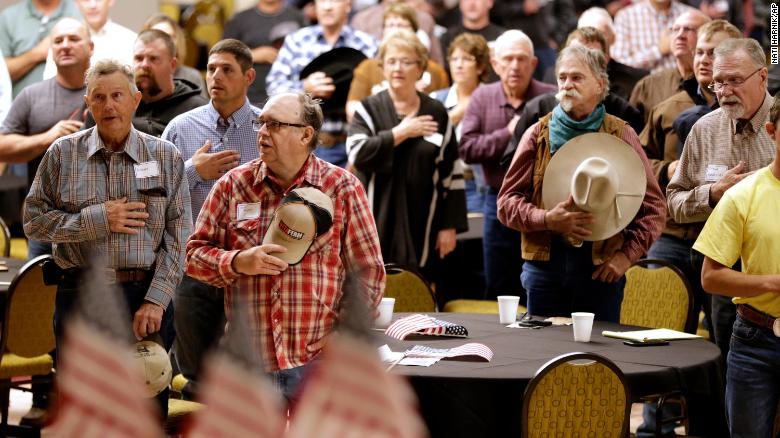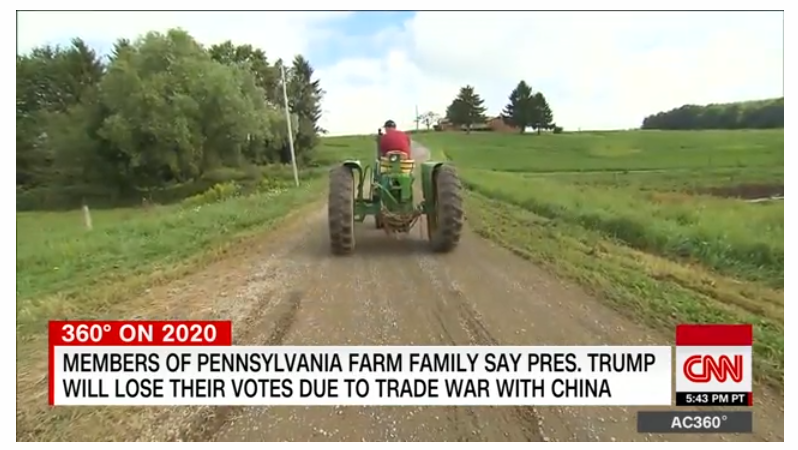CNN Politics: Now cattle ranchers are mad at Trump, too
By Katie Lobosco and Vanessa Yurkevich, CNN | October 3, 2019
Washington (CNN)Hundreds of cattle ranchers rode into Omaha, Nebraska, on Wednesday — some on horseback — hoping to get a message to President Donald Trump: They’re not happy.
Cole Avery, who’s been running a cattle ranch for three years in Mississippi, said he drove 18 hours to be at the rally. He said he works a second job in order to provide for his family.
“I hope that we can be seen and rock the boat a little bit,” Avery, who voted for Trump, said.
He hopes Trump will see how the people who voted him in are struggling.
“Because if it wasn’t for them, he wouldn’t have gotten there in the first place,” he said.
Despite Trump’s frequent claims about helping farmers, he hasn’t changed a 2015 policy allowing imported beef to be labeled as “Product of the USA” if it’s processed and packaged in the US. Ranchers say that means their US-raised beef looks the same as foreign beef to consumers — and that Agriculture Secretary Sonny Perdue hasn’t listened to their concerns.
“We feel very strongly that Secretary Perdue has backed out on America’s family farmers and ranchers, and is representing transnational agribusiness’ interest against the family farmers’ interest,” said Joe Maxwell, a fourth-generation hog farmer and former Democratic lieutenant governor of Missouri.
“It gives very little room for America’s cowboys and cowgirls to have a fair opportunity to sell their cattle,” Maxwell added.
The US Department of Agriculture did not respond to a request for comment for this story.
Last year, the Organization for Competitive Markets and the American Grassfed Association filed a formal petition with the Department of Agriculture to change the labeling standards. But the agency hasn’t taken action to change the rule.
Those two groups, along with 18 others, organized the rally held on Wednesday. They’re also asking for labeling requirements to be written into the proposed US-Mexico-Canada Agreement, which Trump hopes will replace the North American Free Trade Agreement.
They also want Trump to cease efforts to reopen the US market to Brazilian beef. Earlier this year, Trump met with Brazil President Jair Bolsonaro and agreed to take steps to reopen the market, which has been closed to fresh beef since 2017 after some shipments failed safety checks.

Farmers are politically crucial to Trump’s reelection campaign, and many have stood behind the President even as his trade war with China has hurt their exports and lowered the price they can get for commodities like soybean and corn. But some growers are upset with the administration over its biofuel policy.
The beef labeling issue opens up another fight with supporters Trump will need in 2020. Many of the ranchers at the event on Wednesday own small, family-run farms and believe they are getting squeezed by the meat packaging companies, which are dominated by four big companies.
But meat packagerssay they aren’t doing anything wrong.
“Meat Institute members will work with the administration to help ensure beef markets continue to operate in a fair and transparent manner,” said Sarah Little, a spokeswoman for the North American Meat Institute.
Ahead of the rally, organizers spent time helping ranchers sign up for Twitter. Ranchers have been tweeting directly to the President using the hashtag #FreeCattleMarkets in the hopes it will go viral — and catch Trump’s attention. “We need to talk to the President on the platform that the president uses daily to communicate to the world and clearly to the citizens of the United States,” said Maxwell.
A trade deal signed last week by Trump opened up the Japanese market to US beef and pork producers. But while it was considered a win by cattle ranchers, it only gives them about the same level of access to the Japanese market as they would have gotten under the Obama-era Trans-Pacific Partnership in the first place. Trump pulled out of the 11-country deal as one of his first acts as President, opting for a bilateral agreement instead.
